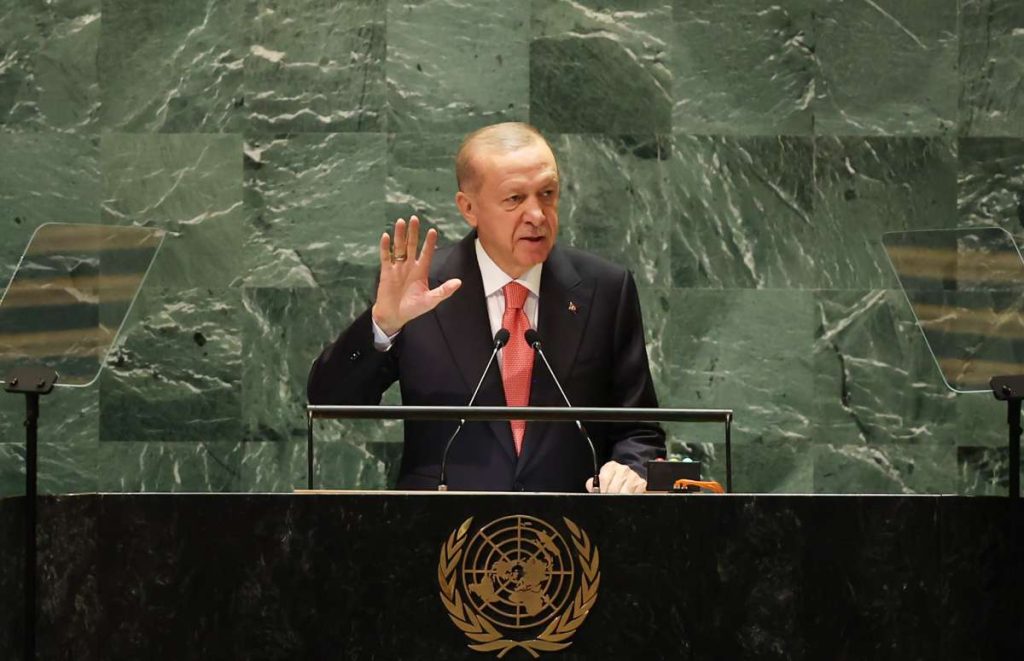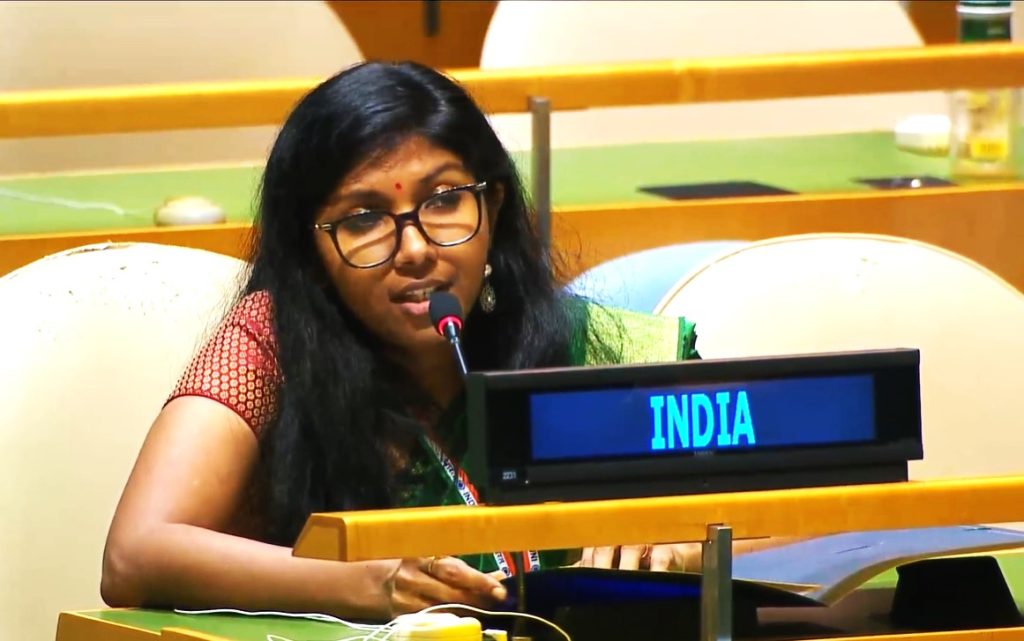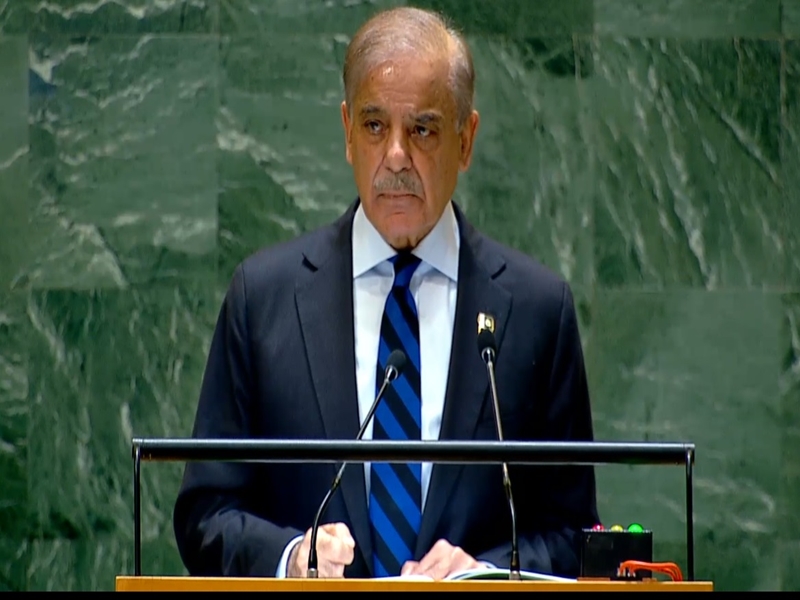None of the world leaders who have spoken so far have even mentioned Kashmir – not even Turkey, which had made an anodyne reference last year.
Totally isolated at the world organisation in trying to raise the Kashmir issue, Pakistan Prime Minister Muhammad Shehbaz Sharif in a sabre-rattling speech at the General Assembly, on Friday threatened a decisive response to a “limited war” by India that he made up.
He made up the claim that India’s “war doctrines envisage a surprise attack and a limited war under the nuclear overhang” to capture the Kashmir territory it occupies.
“Let me state in no uncertain terms that Pakistan will respond most decisively to any Indian negation,” he said of the imagined threat in a bid to get attention to Pakistan’s version of the Kashmir issue.
It takes an ominous tone because on at least three occasions Pakistan launched invasions of India under various pretenses, leading to two wars and a more limited conflict.
Sharif asserted that “thoughtlessly, India has spurned Pakistan’s proposals for a mutual, strategic, restrained regime” and “its leadership has often threatened to cross the line of control and take over territories it occupies”.
Sharif set revoking the changes made in August 2019 a condition for a dialogue.
India’s condition for talks, on the other hand, is an end terrorism emanating from Pakistan.
In setting the condition, Sharif was referring to India ending the special status Kashmir had under Article 370 of the Constitution and integrating Kashmir more closely with the rest of the country.
He said: “To secure durable peace, India must reverse the unilateral and illegal measures it has taken since 5th of August 2019 and enter into a dialogue for a peaceful resolution of the Jammu and Kashmir dispute in accordance with the UN Security resolutions and the wishes of the Kashmiri people.”
However, in fact, Security Council Resolution 47 adopted on April 21, 1948, requires the Pakistani government to first withdraw all its troops and infiltrators from the State of Jammu and Kashmir.
That resolution also requires Islamabad not to fund or arm terrorists who continue attacks in Kashmir, an element Pakistan ignores.
None of the world leaders who have spoken so far have even mentioned Kashmir – not even Turkey, which had made an anodyne reference last year.

Given the isolation, Sharif tried to link the Kashmir issue to Palestine, which has roused widespread attention.
“Like the people of Palestine, the people of Jammu and Kashmir, too, have struggled for a century for their freedom and right to self-determination,” he asserted.
The leader of the Islamic Republic that denies equal rights to non-Muslim minorities, also tried to link the wider concerns over Islamaphobia to India.
He claimed that the “Hindu supremacist agenda in India” foments Islamaphobia and “aggressively seeks the subjugation of 200 million Muslims and the obliteration of India’s Islamic heritage”.
He said that Pakistan and the Organisation of Islamic Cooperation “will work with the UN Secretary General and a special envoy to implement a plan of action to combat the scourge”.
While Pakistan exports terror, Sharif played the victim of terrorism, rattling of a string of names of terrorist organisations like ISIL-K, al-Qaeda, and TTP.
He also spoke of the “90,000” Indian troops stationed in Kashmir, what he said were human rights violations there, and attempts to turn Muslims into a minority there.
India rebukes, calls out cross-border terrorism
India has warned Pakistan that cross-border terrorism against India will “inevitably invite consequences” and ruled out any agreement while the military-run government indulges in terrorism.
Bhavika Mangalanandan, a First Secretary in India’s UN mission, delivered the stern message on Friday while exercising India’s right of reply to Shehbaz Sharif’s attacks on New Delhi.
She said, “Pakistan should realise that cross-border terrorism against India will inevitably invite consequences.”
It was a “travesty” for “a country run by the military with a global reputation for terrorism, narcotics trade. and transnational crime” to have “the audacity to attack the world’s largest democracy,” she said.
Sharif asserted that India had spurned his offer of “a mutual Strategic Restraint Regime.”
Explaining India’s rejection, Mangalanandan said, “There can be no compact with terrorism.”
“Pakistan has long employed cross-border terrorism as a weapon against its neighbours; it has attacked our Parliament, our financial capital, Mumbai, marketplaces, and pilgrimage routes. The list is long,” she said.
Appropriate for raising Pakistan’s terrorism links, Mangalanandan, who is a 2015 batch Indian Foreign Service officer with an MTech degree from IIT Delhi, deals with counter-terrorism matters at the UN.
“The world can see for itself what Pakistan really is,” she said. “We are talking about a nation that for long hosted (al-Qaeda terrorist organisation’s leader) Osama bin Laden, a country whose fingerprints are on so many terrorist incidents across the world, whose policies attract the dregs of many societies to make it their home.”
“For such a country to speak about violence anywhere is hypocrisy at its worst,” she said.
On the subject of hypocrisy, Managalanandan said, “It is even more extraordinary for a country with a history of rigged elections to talk about political choices that too in a democracy.”

“The real truth is that Pakistan covets our territory and, in fact, has continuously used terrorism to disrupt elections in Jammu and Kashmir, an inalienable and integral part of India,” she said.
Hammering on the topic of hypocrisy, she added, “It is ridiculous that a nation that committed genocide in 1971 and which persecutes its minorities relentlessly, even now, dares speak about intolerances and phobias.”
Sharif had accused India of promoting Islamaphobia and persecuting minorities.
Managalanandan said it was no surprise that Sharif should make such accusations against India.
“Yet we must make clear how unacceptable his words are to all of us. We know that Pakistan will seek to counter the truth with more lies. Repetition will change nothing. Our stand is clear and needs no reiteration,” she said.
In reply, Muhammad Faheem, a Third Secretary in Pakistan, repeated most of what Sharif had said in the morning.
He denied that Pakistan had carried out a genocide in Bangladesh during the country’s 1971 War of Independence and denigrated it as “foreign aggression.”
He mentioned allegations that India was involved in a killing in Canada and an attempted murder in the US.

